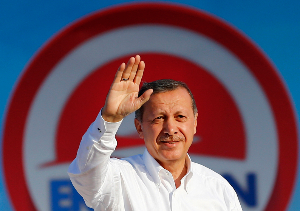The Case for a Coalition with the CHP: the AKP Needs to Refurbish Its Image in the West
By Halil Karaveli (vol. 8, no. 14 of the Turkey Analyst)
The AKP’s loss of its absolute majority in the June 7 parliamentary election may paradoxically offer the regime the chance to refurbish its tarnished image in the West. That, at least, is how some of the leading representatives of the regime judge the present situation. A coalition government with the center-left CHP is perceived as a chance for the AKP to rid itself of the charges of authoritarianism. Western endorsement has always been critically important for AKP, and the party is desperate to regain its lost legitimacy in the West. The question, though, is why the CHP would even contemplate lending itself to a project that would only entrench the AKP regime.

What the Columnists Say
Abdülkadir Selvi in Yeni Şafak reports that Turkey is determined to take action in Syria if the PYD expands to the west of the Euphrates, taking control of Jarabulus, but that this does not mean that Turkey is about to go to war. Özgür Mumcu in Cumhuriyet writes that Turkey is dreaming about a military operation that is internally marketed as an operation against PYD, while it is externally marketed as something that supposedly targets ISIS. Orhan Kemal Cengiz in Bugün writes that the question after the election was if Erdoğan was going to interpret the results as a no to the proposed, unlimited powers of the presidency or as a “road accident,” and concludes that it’s now business as usual for the president. Orhan Bursalı in Cumhuriyet writes that it is very difficult for AKP to accept that the party has lost the possibility to form a majority government on its own, and that the party and the “Mighty” – Erdoğan – intends to never relinquish power. Candaş Tolga Işık at the Habere Dikkat news site writes that handing the seat of the speaker of the parliament to AKP as a gift, only because MHP is unable to curb its hatred of HDP, is going to be the undoing of the party.

What the Columnists Say
Two topics dominate the comments after Turkey’s presidential election: the strong showing of Selahattin Demirtaş, the Kurdish candidate, who succeeded in appealing to a broader electorate, and who is generally seen as the real star of the election; and the failure of Ekmeleddin İhsanoğlu, the lackluster joint candidate of the opposition parties CHP and MHP. Liberal and social democratic commentators see Demirtaş’ success as heralding the birth of a new left. These commentators stress that the CHP needs to heed the call of this new left and warn that the party is doomed if it persists in allying itself with the rightist MHP. Meanwhile, the public rift within the AKP between the supporters of president-elect Recep Tayyip Erdoğan and the outgoing president Abdullah Gül has led many commentators to speculate about the future of the AKP. The prediction is made that Turkey’s course will be determined by the outcome of the intra-AKP struggle.
Turkey's Presidential Election: The Clouds on Erdogan's Horizon
By Gareth Jenkins (vol. 7, no. 14 of the Turkey Analyst)
Despite his convincing victory in the presidential elections on August 10, 2014, there appears little prospect of Prime Minister Recep Tayyip Erdoğan being able to replace Turkey’s parliamentary system with a presidential one and ruling the country singlehandedly for two successive five-year terms.

What the Columnists Say
The nomination of Ekmeleddin İhsanoğlu as the joint candidate of the two opposition parties CHP and MHP in the upcoming presidential election has set off a lively debate among pro-CHP, secularist commentators.





